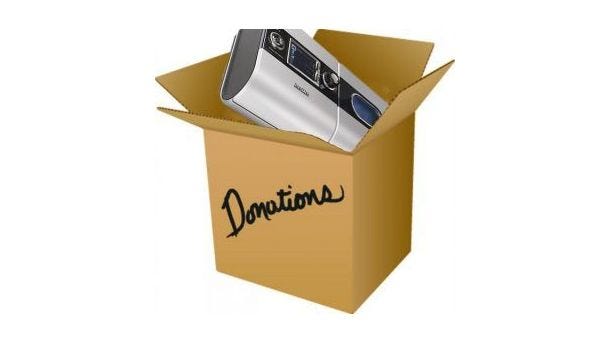Your Used CPAP Equipment Could Save a Life
Here are some great, trusted ways to donate your old machines.
1.The American Sleep Apnea Association
The American Sleep Apnea Association was founded in 1990. They are a nonprofit which works to promote awareness of sleep apnea. They want to continue the research and improvements in treatment for the disease. Their mission statement describes that they are "dedicated to reducing injury, disability, and death from sleep apnea and to enhancing the well-being of those affected by this common disorder."
The ASAA's CPAP recycling program allows those who need CPAP therapy to receive the necessary equipment even if that individual's insurance program won't pay for the machine. About 22 million Americans suffer from sleep apnea, and the program dedicates itself to getting life-saving equipment to as many of those 22 million people as possible. Another big bonus of the recycling program is that it keeps functional equipment out of already-overcrowded landfills.
The ASAA specifies on their website that they do not accept the following kinds of machines:
- PAP devices that are 8 years old or older
- PAP devices that have more than 10,000 hours of use
- ResMed devices - S6 or earlier models
- Philips Respironics devices - RemStar Plus LX, Aria LX, or Solo
- Fisher & Paykel devices - Sleep Style 600 or Icon
- Puritan Bennet - Good Knight
For more information on the ASAA's donation process, visit the ASAA.
2.The Reggie White Sleep Disorders Research and Education Foundation, Inc.
Reggie White was an American football star. He played defensive end and tackle for the Philadelphia Eagles, the Green Bay Packers, and the Carolina Panthers during the late 80's and 90's. He's one of the most decorated players in NFL history. He's also in both the College and Pro Football Halls of Fame. In December of 2004, White passed away unexpectedly at age 43 due to complications including sleep apnea.
White's wife, Sara, co-founded the Reggie White Foundation alongside the Sleep Wellness Institute in Wisconsin. She realized that her husband's life could have been prolonged had he been treated for sleep apnea, and set out to "help people of all economic backgrounds to understand the symptoms and risks of [sleep disorders]."
Another part of the Foundation's philosophy is the importance of providing CPAP therapy to people who cannot afford it. The Foundation provides gently used equipment to patients who have a current prescription for CPAP equipment and who qualify for assistance.
The Reggie White Foundation's criteria for donated equipment is a bit simpler than the ASAA's. The machine must be no more than 5 years old in order for the Foundation to refurbish it. For safety purposes, masks or other types of equipment (tubing, etc.) are not accepted unless they are in their original packaging. The Foundation also states that it cannot cover the shipping costs to get your machine to their facility. But, they provide a receipt that renders your donation tax-deductible.
Here are some FAQs about donating to the Reggie White Foundation.
3.The Kibogora Initiative (via Secondwind CPAP)
Secondwind CPAP is a second-hand CPAP shop in Minnesota. They have a CPAP recycling program which in some cases involves paying you for your used CPAP equipment. In the case that they cannot make you an offer on your machine based on its condition, however, they work with several different groups to allow you to donate your equipment. One of the groups they work with is the ASAA, and the other is the Kibogora Initiative.
The Kibogora Initiative is an ongoing program in its 15th year. Its original mission was to care for the children of Rwanda who lost their parents to genocide. Secondwind CPAP's website says, "Since [it began], the program has grown, with those very children [it] helped, to broaden [its] scope to assist in the resolution of critical issues surrounding health care in the local communities. The focus of Secondwind CPAP is to provide donated CPAP devices to the Kibogora Project, for the treatment of Rwandan's neonatal population."
For questions relating to donating your CPAP equipment to the Kibogora Initiative, contact Mark Seager, Respiratory Therapist at mark@secondwindcpap.com.
For more information on the Kibogora Initiative, click here.
Check out our Care and Buying Tips Resource to download a PDF of instructions on donating your used CPAP machine.




